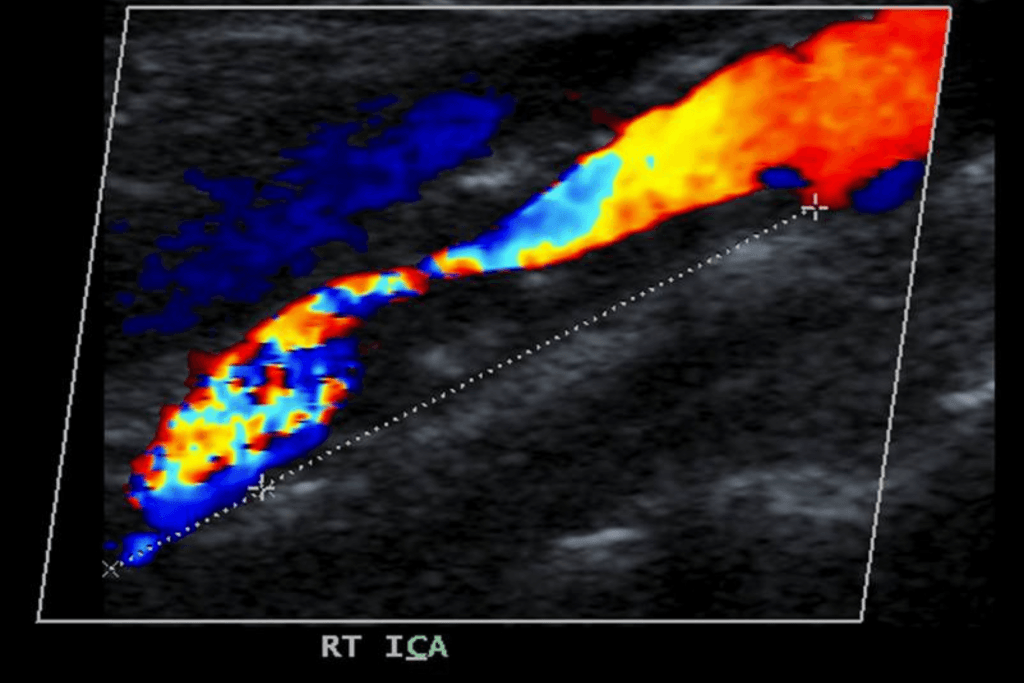Carotid Artery Duplex Ultrasound Scan

Essential stroke prevention with OneMedicine
At OneMedicine, we offer the Carotid Artery Duplex Ultrasound Scan, a vital test for assessing the health of your carotid arteries—the major blood vessels that supply blood to your brain, neck, and face.
This non-invasive scan is especially important for individuals at risk of stroke due to plaque buildup (atherosclerosis) in the carotid arteries. The scan helps detect narrowing or blockages in these arteries that can significantly increase the risk of a stroke or transient ischaemic attack (TIA).
What is a carotid artery duplex ultrasound scan?
A Carotid Artery Duplex Ultrasound Scan is a specialised test that combines traditional ultrasound imaging with Doppler ultrasound technology to provide detailed information about the structure of the carotid arteries and the blood flow within them. The test helps identify atherosclerosis, a condition in which fatty deposits build up on the artery walls, potentially leading to reduced blood flow or clot formation, which can cause a stroke.
The scan is painless and non-invasive, making it a simple yet powerful tool for early detection and prevention of stroke. It is typically recommended for individuals who have risk factors such as high blood pressure, high cholesterol, diabetes, or a family history of cardiovascular disease. It may also be advised for patients who have already experienced a stroke or TIA.
Cost
- Carotid artery Duplex Ultrasound Scan £ Get in touch
Why is a carotid artery duplex scan important?
- Detecting plaque buildup: Atherosclerosis in the carotid arteries can lead to narrowing or blockages, which reduce the amount of oxygen-rich blood reaching the brain. Early detection of plaque buildup through a carotid duplex scan allows for timely intervention, potentially preventing a stroke or TIA.
- Assessing stroke risk: For individuals with symptoms such as dizziness, blurred vision, difficulty speaking, or numbness on one side of the body, this scan can help assess whether these issues are related to reduced blood flow in the carotid arteries. It provides a detailed view of whether plaques or clots are restricting blood flow to the brain.
- Guiding treatment: If your scan reveals narrowing of the carotid arteries, Dr Ibrar Ahmed can advise on the best course of action to reduce your stroke risk. This may include lifestyle changes, medications to lower cholesterol or blood pressure, or in more severe cases, surgical interventions such as carotid endarterectomy or stenting to clear blockages and restore proper blood flow.
- Monitoring progress: For patients already diagnosed with carotid artery disease, regular duplex scans help monitor the progression of the condition. This allows Dr Ahmed to track how well treatments are working and whether any further steps need to be taken to reduce the risk of stroke.
When is a scan recommended?
A carotid artery duplex scan is recommended for individuals who:
- Have risk factors for atherosclerosis such as high cholesterol, hypertension, diabetes, or smoking
- Have experienced stroke-like symptoms such as temporary vision loss, speech difficulties, or weakness on one side of the body
- Have a history of stroke or TIA
- Are over the age of 60 with risk factors for cardiovascular disease
- Are preparing for surgery or undergoing cardiovascular risk assessments
How is the scan done?
The carotid artery duplex scan is a simple, non-invasive procedure that usually takes about 30 to 45 minutes. Here’s what to expect:
Preparation: You will be asked to lie on an examination table with your head slightly tilted to expose the neck. A clear gel will be applied to your neck to help transmit the ultrasound waves.
Ultrasound imaging: A small handheld device called an ultrasound probe will be gently pressed against your neck. This probe sends sound waves into your carotid arteries, which bounce back to create detailed images of the artery walls and the blood flowing through them.
Doppler ultrasound: In addition to the structural images, a Doppler ultrasound will be used to measure the speed and direction of blood flow in the carotid arteries. This helps identify any areas where blood flow is reduced due to blockages or narrowing.
Results: Once the scan is complete, Dr. Ahmed will review the images and blood flow measurements to assess the condition of your carotid arteries. You will receive a detailed explanation of the findings and any recommended next steps to manage your stroke risk.
Get seen by Dr Ibrar Ahmed
f you are at risk of stroke or have symptoms related to reduced blood flow to the brain, a carotid artery duplex ultrasound can provide vital insights into your health. Early detection of carotid artery disease allows for effective treatment and helps prevent serious complications like stroke.
Don’t wait—schedule your carotid artery duplex ultrasound at OneMedicine today and take the next step in protecting your cardiovascular health.






